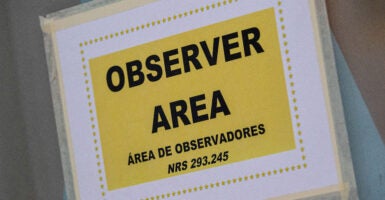Testifying to a congressional panel, a federal election official referred Thursday to citizens who seek public records as a “weaponization” targeting election workers.
The subject of the hearing by the House Administration subcommittee on elections was election observers, activists whom Democrats and the corporate media have criticized heavily in recent years as threats to democracy.
Benjamin Hovland, vice chairman of the U.S. Election Assistance Commission, called for “a balance between transparency and security” in all elections.
“We are seeing significant turnover for election officials and poll workers,” Hovland, appointed to the commission by former President Donald Trump, told the House panel.
“When you look at the environment that election officials are facing, really since 2016, we’ve seen an increase in cyberthreats, challenges with mis- and disinformation, challenges then compounded by physical threats and harassment,” Hovland said.
“We’ve more recently seen the weaponization of records requests,” he said. “Election officials across the country are inundated and really need our support.”
Although a Trump appointee, Hovland has voiced support for grants to local election offices from Facebook founder Mark Zuckerberg and his wife for the 2020 presidential election. This is a controversial point among many Republicans who oppose private money used to finance election administration.
All government information is generally open to the public, with some exceptions, under the federal Freedom of Information Act and various state versions of FOIA.
Hovland was responding to questions from Rep. Joe Morelle, D-N.Y., ranking member of the full House Administration Committee.
Hovland noted “widely reported concerns” about violence against election workers before the 2022 midterm elections, which he said “thankfully did not materialize.”
Such reports were an effort by big media and Democratic Party partisans who are trying to intimidate election observers, argued Lynn Taylor, president of the Virginia Institute for Public Policy and chairwoman of the Virginia Fair Elections Coalition.
“Notwithstanding the role of poll watchers embedded in state and federal law,” Taylor testified, “for the past two years there has been a steady drumbeat of the media, the current administration, and partisan organizations advancing the false narrative that citizen poll watchers are unnecessary and even a threat to democracy.”
As I explain in my book, “The Myth of Voter Suppression,” to be an election observer a person must be legally approved on behalf of his or her respective political party.
The 1965 Voting Rights Act has an entire section authorizing federal election observers. The State Department sends election observers to budding democracies around the world.
The 2005 report from the so-called Carter-Baker Commission on election reforms says: “All legitimate domestic and international election observers should be granted unrestricted access to the election process, provided that they accept election rules, do not interfere with the electoral process, and respect the secrecy of the ballot.”
A total of 48 states and the District of Columbia specifically recognize poll watchers or observers in their election laws. Oregon and West Virginia are the exceptions.
In June 2021, the Justice Department and the FBI set up a national hotline on threats to election officials, designed to protect election administrators and other workers from activists who step over the line of civility.
After more than a year, the FBI-Justice Department hotline had received about 1,100 reports of “hostile contacts” between individuals and election officials. Of those, about 90% were deemed not to be threats.
Of four cases leading to criminal charges, none involved threats againstelection officials made by certified poll watchers, Taylor told lawmakers.
“Observers are critical to ensuring integrity and voter trust in our elections,” said subcommittee Chairwoman Rep. Laurel Lee, R-Fla., who previously ran elections as Florida secretary of state.
“We must work together to ensure we have transparency into how elections are administered so that all voters can have confidence in the outcomes,” Lee said.
“There is a saying among election officials: Elections are partisan. Election administration is not.”
Have an opinion about this article? To sound off, please email [email protected], and we’ll consider publishing your edited remarks in our regular “We Hear You” feature. Remember to include the URL or headline of the article plus your name and town and/or state.




























